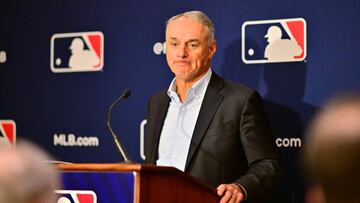Deadline Day to save MLB season
The February 28 deadline to salvage a March 31 start to the regular MLB season is upon us, but are the two sides any nearer to reaching a deal?


If you are anything like me, you probably live in a strange world of zero expectations and 100% hope when it comes to these negotiations. Long ago, I reconciled myself to the idea that a full 162-game schedule was probably out of reach for this season. But secretly, in the dark recesses of my mind, I held out a forlorn hope that maybe, just maybe, an agreement would be reached. And the masochist in me says that it can still happen. We are in the eleventh hour, even the final few ticks of the clock before midnight if you will, but there is still the very slim possibility that this standoff will end. I won’t hold my breath, though.
As the deadline approaches, there are more questions than answers in this saga. Both sides are so entrenched that movement crawls at a snail’s pace. And rather than getting ever-closer to an agreement, the owners and the MLBPA seems to be engaged in a diabolical waltz, when one side gives in one area, the other instinctively retracts.
Big day today. #MLB pic.twitter.com/UDl7aEmW7L
— Ken Davidoff (@KenDavidoff) February 28, 2022
As the lockout enters its 89th day, we have reached the self-imposed deadline for negotiations, and for the eighth day in a row, the two sides have had face-to-face talks. The MLB has not set an exact hour to the end of bargaining, so there is, of course, the possibility that today’s session could stretch into the wee hours if a deal seems within grasp.
Both sides still have a wide gulf between them, but with the pressure now being made real, there is added incentive to get a deal done sooner rather than later. And it needs to be stressed that the deadline is self-imposed. You might be tempted to say self-inflicted. Honestly, if they came to a deal later in the week, would the start of the season be delayed? Probably not. I mean, each day that the season is cancelled, the players are losing $20.5 million in salary money, which may be a drop in the ocean compared to what the teams stand to lose. If there was a will, then a way could most definitely be found.
MLB/players union deadline-day meeting is scheduled to begin in a few minutes. While the deadline is still said to be in place, if there’s more progress today they would keep negotiating. While things nearly came apart at one point Saturday, there’s some hope for a deal now.
— Jon Heyman (@JonHeyman) February 28, 2022
The MLBPA has not remarked on MLB Commissioner Rob Manfred’s statement that 28 days of training are needed before the start of the season. It is likely that they could get started on less. Given that the lockout was not instigated by the players, but by ownership, and given that the players have repeatedly stressed that they are ready to play at any moment, it seems likely that they would be ok to start the season on 20 days, or even 15 if it is necessary.
The biggest bone to pick between the sides seems to revolve around the luxury tax thresholds and rates, the size of the bonus pool, salary arbitration eligibility, and minimum salaries. The players are looking to shake up the club revenue sharing formula and the owners want to expand the playoffs to 14 teams instead of the current 12.
MLB CBA negotiations: pic.twitter.com/3EXnKBzyV0
— Danny Vietti (@DannyVietti) February 26, 2022
MLB has offered to raise the luxury tax threshold from $210 million to $214 million, with a further increase to $220 million by 2026. Players have asked for a $245 million threshold, extending to $273 million by the final year of the CBA.
The players have asked for the pre-arbitration pool to consist of $115 million distributed to 150 players, while management has countered with $20 million to be split among only 30 players.
If MLB announces cancelled games today, that will be a decision by the league just as locking players out and waiting 43 days to make a proposal were decisions by MLB
— Ben Nicholson-Smith (@bnicholsonsmith) February 28, 2022
There’s no rule saying a deal couldn’t be reached tomorrow allowing for an on-time starthttps://t.co/BIMxdZ66Im
Related stories
While these differences may seem insurmountable, the amount of money to be lost by not reaching an agreement could see these two sides closer to a deal than you might imagine. Perhaps the season will start a week late, or perhaps the season will be started on a short training period. At the lower levels of ball, the beginning of the season often is the training period, so the question is will fans prefer that situation to waiting a bit longer? Perhaps. I suspect, however, that most fans would prefer to watch what, in effect, would be a training game, than to have nothing at all. It is the uncertainty that is galling.
Perhaps it is my unending optimism, but I disagree with the media’s depiction of this dispute as somehow “killing” baseball. Baseball is bigger than that, better than that. Yes, contract negotiation is the ugly side of the beautiful game. But, as the man said, baseball is all that is great about America, and it can be again. My zero expectation has been seen, and even exceeded by this lockout. Let's see if these two bickering sides can do something about that 100% hope.

